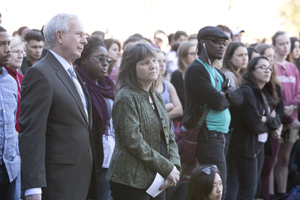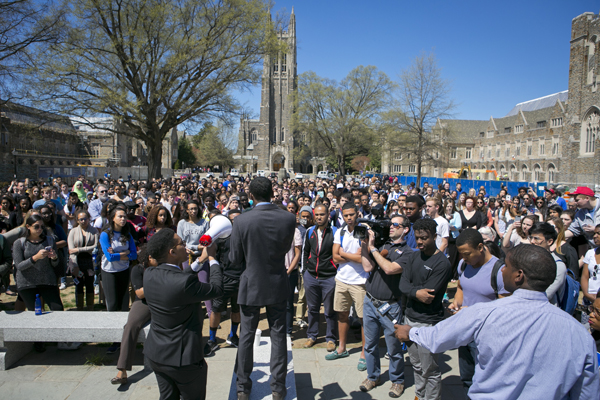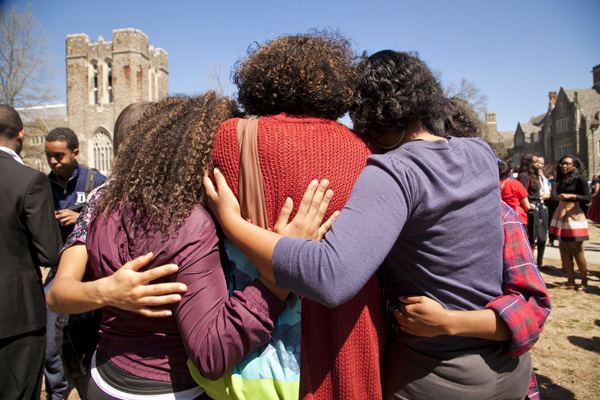
“We are not afraid. We stand together,” was the response from the Duke University community Wednesday as students, faculty and others gathered at several events to express outrage about a noose found hanging at around 2 a.m. in the Bryan Center Plaza.
Several hundred marchers chanted those words at an early afternoon rally on the plaza organized by the Black Student Alliance (BSA) and others. A far larger crowd, estimated at more than 1,000 people, assembled for a forum at 5 p.m. in front of Duke Chapel.
“This is a beautiful day and this is a beautiful place, but we are gathered here because something ugly happened here today,” Duke President Richard H. Brodhead told the crowd that filled the area in front of Duke Chapel and the surrounding area. Recounting the ugly history of lynching, he called the noose incident “abhorrent” and said “we have no intention of going back now.”
“I repudiate that. That’s not the Duke I know,” Brodhead said.
“These events are painful; they diminish us as a community,” said Provost Sally Kornbluth, who said she was personally “stunned” at the news. She called on students to speak up whenever they see or hear someone being treated in ways that diminish them, saying “there are no bystanders here.” She also spoke directly to the faculty, saying “You have black students in your classrooms. You need to understand what they’re feeling.”
Students, faculty and staff gave remarks in a forum on campus race relations.
Earlier in the day, Brodhead and Kornbluth sent an email to the Duke community deploring “in the strongest possible terms” what they described as “cowardly acts of hatred.”
Campus officials have not determined who placed the noose of thin yellow rope, which officials removed quickly from the tree. They have asked anyone with information about it to contact Duke Police at (919) 684-2444. A photo of the noose circulated quickly, first on campus social media channels and then more widely, leading to extensive news coverage.
Vice President for Student Affairs Larry Moneta responded early Wednesday morning with an email message to students describing his “disgust and anger" about the incident. "To whomever committed this hateful and stupid act, I just want to say that if your intent was to create fear, it will have the opposite effect," Moneta wrote.
Lavanya Sunder and Keizra Mecklai, the current and incoming presidents of Duke Student Government (DSG), also condemned the incident, calling it “shocking and morally deplorable.” In a message to fellow students, they urged, “We must stand united as a community -- students, faculty, staff and all others who call Duke their home -- to eliminate intolerance and prejudice from this campus.” Both also spoke at the afternoon forum, at which several students in the crowd shouted concerns.

In their afternoon email, Brodhead and Kornbluth referred to “several racial incidents” in recent weeks, “including a report of hateful speech directed at students on East Campus.” BSA President Jamal Edwards, a junior from California, also put the noose incident into a broader context, saying at the beginning of the afternoon march “this is not an isolated event” and “some members of this community don’t want us here.” Simultaneously, he noted the many diverse students who marched alongside their African-American classmates. “What we want to believe is true is constantly challenged,” he said.
After the marchers gathered on the plaza near the tree where the noose was found, Edwards spoke again, calling on the Duke community to create a welcoming environment for all students, including black students and other minorities. “Today I look into this crowd and see allies for black students and for all marginalized students on this campus,” he said. “I refuse to be driven to a place of fear.”
As his speech ended, Natalie Mauney, a sophomore from Charlotte, stood applauding in the crowd. “I’m appalled that things like that still happen,” she said. “I hope it will wake people up and make them ready to stake a stand.”
Suman Gidwani, a senior from New Jersey, paused a few moments before commenting on the day’s events. “I’m just angry,” she said. “It’s not just this, but other events, too – what happened with the three students in Chapel Hill, other incidents around the country. That people can have this kind of feeling in their hearts really upsets me.”

Members of the Duke community discussed the incident and expressed concern throughout the day. Some gathered at the Mary Lou Williams Center, where members of CAPS were available to provide support. Others met at the Center for Multicultural Affairs, which remained open late, and at other venues that Moneta called “safe spaces.” DSG and BSA both held evening events, and “Unity Through Diversity” sponsored an evening town hall. On East Campus, first-year students were invited to "Chalk the Walk” by filling in the large traffic circle with supportive words and messages.
Faculty members of the Executive Committee of the Academic Council (ECAC) dispensed with a planned agenda Wednesday, focusing instead on the incident. “It doesn’t reflect what Duke is,” said ECAC member Anne Yoder, director of the Duke Lemur Center. “We share the responsibility to create a more welcoming environment.”
“I don’t know who did this, but it’s almost immaterial,” said Ben Reese, vice president for institutional equity. “The pain is so deep for the African-American community and, indeed, for everyone.”
Speaking at the forum, sociologist and dean of social sciences Linda Burton described how racism and lynching had touched her own family. She then urged members of the Duke community to “not let fear and ignorance guide your actions as some have already done today,” saying the university is “a place where tolerance and civility should thrive.”

Students embraced in a gathering at the West Campus bus stop. Photo by Chris Hildreth / Duke Photography.